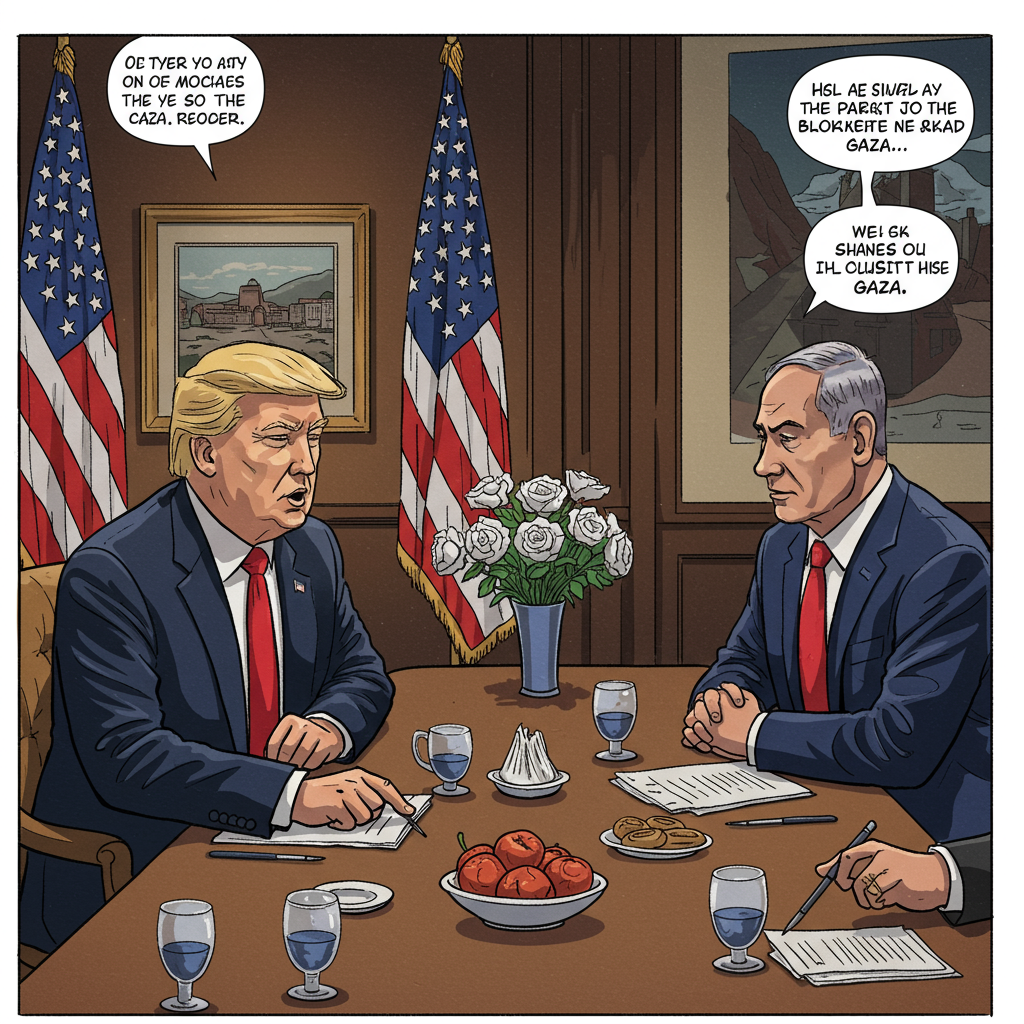Former President Donald trump recently hosted Israeli Prime Minister Benjamin Netanyahu for a significant private dinner. The high-profile meeting took place at a critical moment for Middle Eastern diplomacy, set against ongoing international efforts to broker a ceasefire in Gaza and persistent negotiations concerning Iran’s nuclear ambitions. The encounter highlighted the complex dynamics between the two leaders and included expressions of mutual admiration alongside a surprising political gesture. This discussion underscored the evolving relationship between the former U.S. president and the current Israeli prime minister at a pivotal juncture for regional stability and peace initiatives.
Held on a Monday evening, the dinner served as a platform for extensive high-level discussions. Sources close to the former White House staff described the gathering as a “private dinner” where “many important matters” concerning the volatile Middle East were thoroughly reviewed. The meeting reinforced the enduring, albeit complex, bond between these two prominent figures. Their discussion was particularly timely given the fluid nature of regional challenges and the continued push for peace.
Netanyahu Nominates Trump for Nobel Peace Prize
A notable development during the dinner was Prime Minister Netanyahu’s announcement of a formal nomination: he has put forward former President Donald Trump’s name for the Nobel Peace Prize. Netanyahu presented Trump with a physical copy of the nomination letter already submitted to the Norwegian Nobel Committee. This action immediately drew considerable attention and analysis from observers worldwide, especially considering the current geopolitical climate.
Netanyahu provided several specific justifications for this significant nomination. He lauded Trump’s “leadership of a just cause,” citing the U.S. decision the previous month to allow American warplanes to strike Iranian nuclear sites as a prime illustration. Furthermore, Netanyahu credited Trump with actively pursuing “peace and security” across “many lands.” He highlighted Trump’s indispensable role in facilitating the Abraham Accords, groundbreaking agreements normalizing relations between Israel and several Arab nations. Netanyahu emphasized that Trump is “forging peace, as we speak, in one country, in one region after the other,” painting a picture of expanding regional calm driven by Trump’s distinct diplomatic approach.
Beyond specific policy successes, Netanyahu conveyed deep appreciation and admiration for Trump’s leadership. He stated this sentiment was shared “not only of all Israelis, but of the Jewish people” and countless supporters globally. He also acknowledged the vital contributions of Trump’s “extraordinary team,” suggesting that combined efforts were essential in navigating difficult issues and seizing opportunities. The nomination serves as a potent political statement, likely intended to bolster the strong ties between the two figures.
Behind the Nobel Nomination
The timing and underlying motivations behind Netanyahu’s Nobel nomination have become subjects of intense debate. Some analyses suggest the gesture was less a straightforward endorsement of global peace and more a calculated strategy. It’s argued that Netanyahu might have sought to “soften up” Trump ahead of critical policy discussions, particularly aiming to secure Trump’s continued backing for actions against Iran’s nuclear program, following the recent U.S. airstrikes that aligned with a long-standing Israeli objective.
Commentators also propose that Netanyahu heavily relies on his relationship with Trump as a “political crutch.” Given potential instability within Netanyahu’s governing coalition in Israel, maintaining a strong connection with a prominent American political figure like Trump could significantly strengthen his domestic position. Notably, Trump has previously publicly called for corruption charges against Netanyahu to be dropped and has even linked U.S. support for Israel to Netanyahu’s political viability, adding layers of complexity to their relationship dynamics.
However, the nomination also provoked swift criticism. Critics pointed out the apparent contradiction in praising Trump for peace efforts while conflicts persist in places like Gaza and Ukraine. Ruth Ben-Ghiat, an author specializing in authoritarianism, reportedly described the nomination as “pathetic,” raising questions about its sincerity, particularly given Netanyahu’s own ongoing legal issues. Domestically in the U.S., some Republican figures, including Representative Jim Jordan, expressed support, believing Trump “certainly deserves it.” Yet, they often acknowledged the political unlikelihood of him receiving the award, especially following his recent felony conviction. This is not Trump’s first nomination; he has received several previously, although some were later withdrawn, illustrating the often politically charged nature of these nominations. Reports indicated over 300 candidates were nominated for the prize this year.
Urgent Focus: Gaza Ceasefire Efforts
A primary focus of the Trump-Netanyahu dinner was the urgent push for a ceasefire in the ongoing conflict between Israel and Hamas in Gaza. The conflict, nearing its third year, remains a critical concern for international diplomats and regional leaders. White House Press Secretary Karoline Leavitt reiterated that ending the conflict and ensuring the release of all hostages held by Hamas since the October 7 attacks remains Trump’s “utmost priority” in the region.
Significant discussion centered on a potential ceasefire proposal reportedly endorsed by Israel and transmitted to Hamas via mediators. White House officials expressed optimism for Hamas’s acceptance to facilitate the return of captives. According to detailed reports emerging from discussions, the proposed deal outlines a multi-phase structure beginning with a substantial truce.
Proposed Gaza Ceasefire Deal Details
Details concerning the potential agreement suggest a phased approach starting with a temporary cessation of hostilities.
Duration: A 60-day temporary ceasefire period.
Hostage Release: The release of approximately ten living Israeli hostages and the remains of eighteen deceased individuals held by Hamas in Gaza. These releases would occur in five separate stages.
Palestinian Prisoners: Concurrently, Israel would release some Palestinian prisoners, although specific numbers and identities are still under negotiation.
Israeli Withdrawal: A partial withdrawal of Israeli forces from specific areas within the Gaza Strip would take place.
Humanitarian Aid: A significant surge in the flow of humanitarian aid into the territory would be implemented to address the severe needs of the civilian population. Specifics regarding supply and distribution are still being negotiated.
Future Talks: The expectation is that U.S.-backed negotiations aimed at reaching a more permanent end to the war would commence during this 60-day truce period. Hamas seeks assurances that these talks would continue beyond the initial 60 days if needed, while Israel is hesitant to agree to language that would restrict its future military operations.
Trump himself commented on the ceasefire situation before the dinner. He stated that Israel had already agreed to the “necessary conditions to finalize” a 60-day truce to allow negotiations to conclude the conflict. He publicly urged Hamas to accept this offer promptly before the conditions for a deal potentially worsened. Days before the meeting, Trump expressed confidence that negotiators were “very close to a deal on Gaza,” predicting the release of “quite a few” of the remaining hostages within the upcoming week. These statements underscore the perceived urgency and delicate nature of the ongoing indirect talks facilitated by mediators like Qatar and Egypt.
The “Day After” Gaza Debate
A significant point of contention in discussions revolved around the future governance and recovery of Gaza following the conflict—often referred to as the “day after.” Both Israel and the Trump administration firmly oppose any post-conflict role for Hamas in governing the enclave, citing concerns about potentially replicating situations like Hezbollah’s strong influence in Lebanon. Hamas, however, has pushed for the U.S.-backed Gaza Humanitarian Foundation (GHF) to cease operations, advocating for the UN and other international organizations to fully manage aid distribution. U.S. officials see potential for compromise on this aid point, suggesting a blended model involving both GHF and UN participation rather than completely removing the GHF. The Israeli Ambassador to the U.N., Daniel Dannon, also mentioned the possibility of a “combination” approach for aid administration.
Controversial Relocation Plan
Adding another layer of complexity to the “day after” discussions, Israeli Prime Minister Benjamin Netanyahu publicly endorsed a controversial proposal by former U.S. President Donald Trump concerning the future of the Gaza Strip. This plan involves the potential relocation of Palestinians from the territory, allowing for its redevelopment into a luxury waterfront area that Trump has previously dubbed the “Riviera of the Middle East.”
Netanyahu framed the proposed relocation as a matter of “free choice” for Gaza residents. He stated that while those wishing to stay should be allowed to do so, individuals who desire to leave should also have that option. According to Netanyahu, Israel and the United States are actively collaborating to identify countries willing to accept displaced Palestinians from Gaza, with discussions reportedly nearing positive outcomes with several nations. Trump affirmed cooperation with countries surrounding Israel, suggesting that “something good will happen.”
Netanyahu’s comments represent his most explicit backing for this contentious concept, which Trump initially floated earlier in the year. The proposal has drawn significant international backlash, facing condemnation from U.S. allies, Arab leaders, and human rights organizations. Critics argue that the plan, often presented under the guise of economic development, essentially amounts to ethnic cleansing. The White House had previously attempted to distance itself from some of Trump’s original language on the matter.
This renewed support for the relocation vision, coupled with Netanyahu’s consistent rejection of establishing an independent Palestinian state, suggests a potential future path that could involve displacing or resettling the Palestinian population abroad. This approach starkly contrasts with decades of traditional U.S. foreign policy, which has advocated for a two-state solution involving an independent Palestinian state coexisting alongside Israel as the preferred route to Middle East peace.
Netanyahu reiterated his stance on Palestinian governance, asserting that Palestinians should have the authority to govern themselves but without any powers that could threaten Israel. He stressed that overall security control must remain permanently in Israeli hands. While acknowledging this arrangement wouldn’t constitute a “complete state,” Netanyahu indicated this distinction was not a concern for him. He stated a peace agreement would be forged with “those who don’t want to destroy us,” ensuring Israel’s “sovereign power of security” is maintained. The Prime Minister’s endorsement of potential mass relocation is viewed as potentially undermining ongoing ceasefire and hostage negotiations.
The current conflict in Gaza, ongoing since the October 7, 2023, Hamas attack, has caused a severe humanitarian crisis. Israeli military actions have reportedly resulted in extensive casualties and displaced over 80% of the population, leading to warnings of famine by the U.N.
Strategic Talks on Iran
Beyond the immediate concerns of the Gaza conflict and the Nobel nomination, the dinner also delved into the strategic challenge posed by Iran. Trump indicated his administration is actively developing a “permanent deal” with Iran. This long-term objective would aim to compel Tehran to completely abandon its nuclear program. The discussion occurred shortly after the recent U.S. airstrikes on Iranian nuclear sites, signaling a firm stance against Iran’s nuclear ambitions. Some analysis suggests that Trump’s perceived leverage with Netanyahu, partly built on the U.S. joining Israel’s actions regarding Iran, could be used to guide Israel’s direction on the “Iran file” and potentially contribute to a “grand bargain” encompassing both the Gaza ceasefire and broader regional issues.
Broader Context of Trump’s Agenda
The period surrounding the Trump-Netanyahu meeting saw several other notable actions and statements from the former president, reflecting his active engagement across various policy fronts. Trump announced delays in trade tariff negotiation deadlines, impacting potential import tax increases on goods from countries like Japan and South Korea. Days after reports of a potential pause, Trump stated the U.S. would resume weapon shipments to Ukraine, indicating continued support against aggression. Trump’s appointed border czar defended the administration’s immigration enforcement approach, including increased arrests of non-violent migrants. Politically, Trump publicly criticized Elon Musk’s reported plans for a new political entity, calling the idea “ridiculous” and emphasizing his belief in the two-party system. Parallel to discussing a permanent deal, Trump announced his administration had agreed to enter direct diplomatic talks with Iran, potentially scheduling them soon, indicating a multi-pronged approach combining military action and diplomatic engagement. A memo from the DOJ and FBI concluding their review of the Jeffrey Epstein case stated no “Epstein client list” was found and reaffirmed Epstein’s death as suicide.
The meeting between Trump and Netanyahu, while primarily focused on Middle East issues, occurred within this broader context of Trump’s ongoing political activities and pronouncements across domestic and international spheres. Key aides attended the dinner, including Special Envoy Steve Witkoff and Senator Marco Rubio. Other attendees reportedly included Defense Secretary Pete Hegseth and Mike Huckabee, the U.S. Ambassador to Israel. Witkoff was expected to continue engagement in Qatar with mediators, highlighting the direct link between the dinner discussions and ongoing diplomatic efforts.
Frequently Asked Questions
What specific details were discussed about the Gaza ceasefire proposal?
Discussions during the Trump-Netanyahu meeting included specifics of a potential 60-day temporary ceasefire. This proposal reportedly involves the release of approximately ten living Israeli hostages and the remains of eighteen deceased individuals held by Hamas, occurring in five phases. In return, Israel would release some Palestinian prisoners, conduct a partial withdrawal of forces from parts of Gaza, and allow a significant increase in humanitarian aid. The proposal also includes commencing talks during this truce period aimed at a permanent ceasefire.
Why did Israeli Prime Minister Netanyahu nominate Donald Trump for a Nobel Peace Prize?
Prime Minister Netanyahu stated he nominated Trump for his leadership in promoting peace and security. He specifically cited Trump’s approval of U.S. airstrikes on Iranian nuclear sites the previous month and his instrumental role in brokering the Abraham Accords, which normalized relations between Israel and several Arab nations. Netanyahu presented the nomination as an expression of appreciation from Israelis, the Jewish people, and global admirers for Trump’s perceived efforts in forging peace in various regions.
What is the controversial “day after” plan for Gaza discussed by Trump and Netanyahu?
Former President Trump has proposed a plan for Gaza’s future post-conflict that involves redeveloping it into a luxury waterfront area, the “Riviera of the Middle East,” possibly requiring the relocation of Palestinians from the territory. Prime Minister Netanyahu publicly endorsed this plan, framing it as a matter of “free choice” for residents to leave if they wish. Critics argue this plan, which involves seeking countries willing to accept displaced Palestinians, amounts to ethnic cleansing and starkly contrasts with traditional calls for a two-state solution.
The dinner between Donald Trump and Benjamin Netanyahu served as a high-profile platform to address critical regional issues and emphasize their continued political alignment. From the unexpected Nobel nomination to pressing negotiations for a Gaza ceasefire and strategy regarding Iran, the meeting underscored the complex challenges and ongoing diplomatic efforts in the Middle East. The discussions and outcomes of this meeting are likely to significantly influence future peace initiatives and the dynamics of key international relationships.
Word Count Check: 1511



